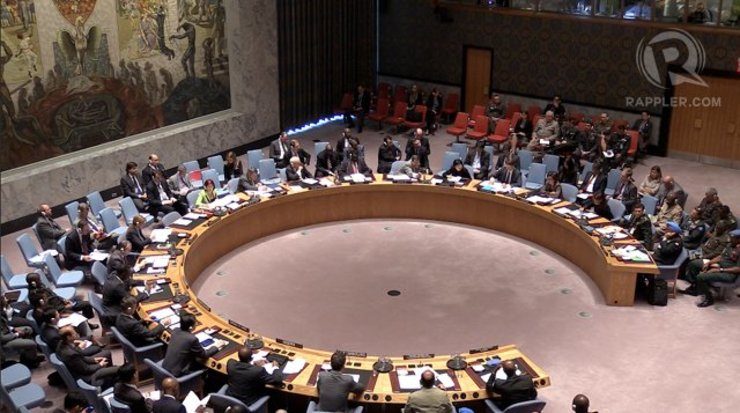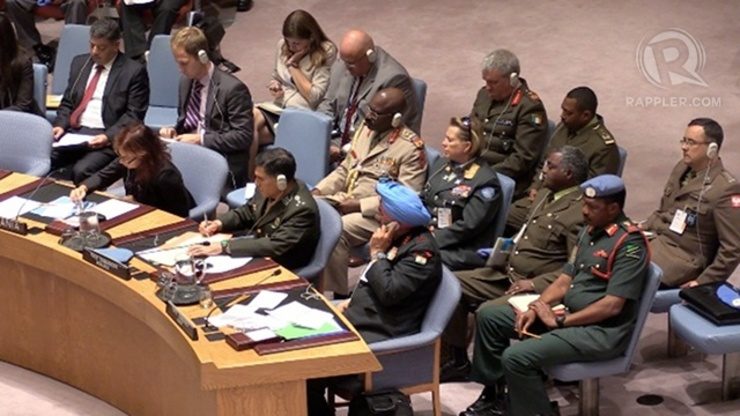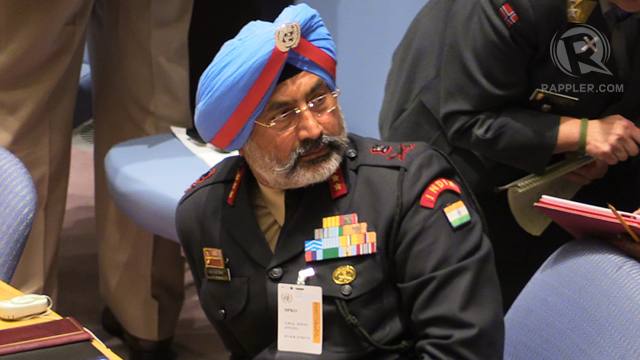SUMMARY
This is AI generated summarization, which may have errors. For context, always refer to the full article.
UNITED NATIONS – Just a month after criticizing Filipino peacekeepers for a supposed “act of cowardice,” the commander of the United Nations peacekeeping mission in the Golan Heights now hails their “courage.”
Lieutenant General Iqbal Singh Singha of India changed his tune as he briefed the UN Security Council on the situation of peacekeepers in the Golan Heights.
Yet at the annual peacekeeping briefing at the UN Headquarters in New York, Singha did not address the controversy over whether or not he ordered Filipino peacekeepers to surrender their weapons to the Al-Qaeda-linked Al Nusra Front. The UN lists Al Nusra as a terrorist organization.
Instead, he lauded the Filipinos caught in a firefight with Syrian rebels, and the 45 Fijian peacekeepers the armed groups abducted for two weeks in late August. Watch here:
“The Filipino and Fijian peacekeepers bravely faced the situation, and exhibited raw courage, resilience and patience,” Singha said on Thursday, October 9.
He added that when 4 countries withdrew last year from the mission known as the UN Disengagement Observer Force (UNDOF), the Philippines was among those that stayed despite two incidents of kidnapping involving its troops.
“It was only the Philippines and India who stayed the course, their soldiers taking on significant extra responsibilities during this period,” Singha said.
The statement was a reversal from an interview Singha gave to India Today in September where he said Filipinos disregarded his orders of “putting down arms,” endangering the lives of the kidnapped Fijians. He called the Filipinos’ unauthorized escape “non-professional” and “an act of cowardice.”
Singha was then responding to criticism from Filipino military chief Gregorio Catapang Jr, who urged the UN to investigate the commander. The Manila-based Catapang approved the Filipinos’ so-called “greatest escape” and decision to defy Singha.
Filipino troops maintained that they acted in self-defense, and that surrendering their arms was no assurance they would not be kidnapped like the Fijians. The UN though has supported Singha’s position, denying that he ordered the troops to surrender weapons.
President Benigno Aquino III last week criticized the UN for the incident, and for giving an “impossible or unclear mission.” He said he is waiting for the results of an investigation, which will form the basis of his decision on whether or not to again send troops to the Golan.
The Philippines pulled out 344 troops a month early in September following the incident, and rebels’ siege of UNDOF positions in the Syrian side of the Golan Heights. It also called for a review of “operational and tactical issues” in peacekeeping “at the highest levels.”
Manila ranks 33rd among countries contributing military and police personnel to UN peacekeeping.

Rebels vowed more kidnappings
Singha revealed that even after the Fijians were released on September 11, the rebels vowed to continue abducting peacekeepers, and stealing UN equipment.
“The radical groups reiterated that if presented with another opportunity, they would detain additional peacekeepers, snatch UN vehicles and weapons, and ransack UN property. They also clearly spelled out that the UN was not required in the area,” he said.
Besides Singha, the commanders of the UN peacekeeping missions in the Democratic Republic of Congo and Mali also briefed the Council. These are the 3 missions facing the gravest dangers in the field, particularly from terrorists.
In the case of the Golan Heights, Singha said that for 40 years, UNDOF effectively fulfilled its mandate to observe a ceasefire and buffer zone between Israel and Syria based on a 1974 agreement.
Yet he said that the spillover from the Syrian civil war in the last 3 years made the task “very challenging, demanding and dangerous.”
“We witnessed an upward spiraling of violence, and peacekeepers were directly targeted by the extremists,” Singha said. “Exchanges of fire, artillery, tank, mortar, automatic weapons, anti-aircraft and small arms, as well as clashes between the two sides take place on a regular basis.”
Still, Singha insisted that the mission still achieves its mandate, even after withdrawing to the Israeli side of the Golan. He said the cooperation between the mission, the UN peacekeeping operations department, and the New-York based Secretariat was “exemplary.”
He said UNDOF is able to handle the threats, acquire the needed weapons, and ensure the safety of peacekeepers.
“We are proactive and on occasion, fired back in self-defense when fired upon,” Singha said.

Will UN change mandate?
Members of the Security Council said they were open to changing the mandate of the peacekeeping missions, with security situations deteriorating due to extremism and terrorism. The Council is the UN’s most powerful organ and sets the mandates of the peacekeeping missions.
Diplomats from the 15-member Council asked pointed questions about what the Council can do but the meeting ended without any outcome. UN Secretary-General Ban Ki-Moon last month ordered a comprehensive review of peace operations, the first in 15 years.
US Ambassador to the UN Samantha Power said the Council must review the mandates of the missions, many of which were set decades ago.
“We need to look at missions afresh. Sometimes we get on auto-pilot but you presented to us and we are witness to the fact that some of the fundamental assumptions at the heart of your missions need to be revisited, challenged, refreshed,” Power said.
Power pointed out that it was a “structural issue” that peacekeepers had two chains of command: their bosses in capitals like Manila, and their UN commanders.
The force commanders and the Council noted that peacekeepers must be more proactive in protecting civilians instead of merely being observers.
Rwanda Ambassador to the UN Eugène-Richard Gasana stressed this point. “A reconfigured mission is necessary for the safety of peacekeepers. The Council needs to have a serious discussion on what this will entail.”
“We need to change how we do business because we don’t do business in the same market any longer.” – Rappler.com
Rappler multimedia reporter Ayee Macaraig is a 2014 fellow of the Dag Hammarskjöld Fund for Journalists. She is in New York to cover the UN General Assembly, foreign policy, diplomacy, and world events.
Add a comment
How does this make you feel?
















There are no comments yet. Add your comment to start the conversation.